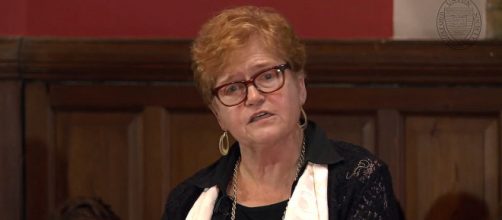President Joe Biden has chosen Holocaust historian Deborah Lipstadt to be his Special Envoy to Monitor and Combat Anti-Semitism, according to a White House announcement on July 30. The statement noted that the Emory University professor had been active at the United States Holocaust Memorial Museum, and she had also previously served on the U.S. State Department's Advisory Committee on Religious Persecution Abroad.
The White House noted that Lipstadt had won "an overwhelming victory" after being taken to court by British Holocaust denier David Irving over alleged defamation.
The Jewish Telegraphic Agency (JTA) said Irving's defeat might be the 74-year-old historian's great claim to fame. The JTA noted that Lipstadt's book about the trial, "History on Trial: My Day in Court with a Holocaust Denier," had been made into a movie in 2016.
Although the historian had publicly supported the presidential campaigns of Barack Obama, she had made her expertise available to conservative politicians, the JTA said. The White House noted that President George W. Bush had chosen Lipstadt to be his representative at a ceremony commemorating the liberation of Auschwitz.
'A transformative teacher'
"Dr. Lipstadt’s nomination is a sign that our country is committed to addressing acts of bigotry and hatred aimed at the Jewish people," said Emory University President Gregory Fenves in a statement on the university's website www.emory.edu.
He said she had been "a transformative teacher since 1993 and an inspiration to generations of students." The White House noted that the historian had founded the Institute for Jewish Studies at the university. Emory University is located in Atlanta, Georgia.
If confirmed by the Senate, Lipstadt would be the fifth person to hold the special envoy position to combat anti-Semitism, the JTA said.
The Hill noted that Congress had elevated the position to the rank of ambassador this year.
On Twitter, U.S. Senator Reverend Raphael Warnock of Georgia said he was "thrilled" to see Lipstadt's nomination. "I look forward to getting her swiftly confirmed so we can work together in the fight against antisemitism," he said.
I'm thrilled @EmoryUniversity’s Deborah Lipstadt has been nominated as the U.S. envoy to combat antisemitism.
Prof. Lipstadt is a brilliant & clear-eyed scholar—I look forward to getting her swiftly confirmed so we can work together in the fight against antisemitism.
— Senator Reverend Raphael Warnock (@SenatorWarnock) August 1, 2021Trump and anti-Semitism
The Forward published an article by Lipstadt about anti-Semitism and then-presidential candidate Donald Trump in July 2016. She wrote that "comparisons between Trump and Hitler are way over the top," but Trump might be considered an "inadvertent anti-Semite." While such a person did not hate Jews, he had "internalized some of the most pernicious stereotypes about Jews," Lipstadt said.
She recalled a speech that Trump had delivered before the Republican Jewish Coalition. She said Trump's remarks to the Jewish audience had employed several anti-Semitic tropes. Although Trump had displayed pride in his Jewish daughter and son-in-law, he might be remembered for "enabling and legitimizing Jew-hatred," the historian concluded.
Swastika in the State Department
The Hill noted that the announcement of Lipstadt's nomination had come the same week as an elevator in the State Department headquarters had been defaced with a carving of a swastika. On July 27, Biden responded on Twitter, saying, "Anti-Semitism has no place in the State Department, in my Administration, or anywhere in the world." The Hill noted that the incident was being investigated.
Let me be clear: Anti-Semitism has no place in the State Department, in my Administration, or anywhere in the world. It’s up to all of us to give hate no safe harbor and stand up to bigotry wherever we find it. https://t.co/RCkwArRjL2
— President Biden (@POTUS) July 28, 2021

